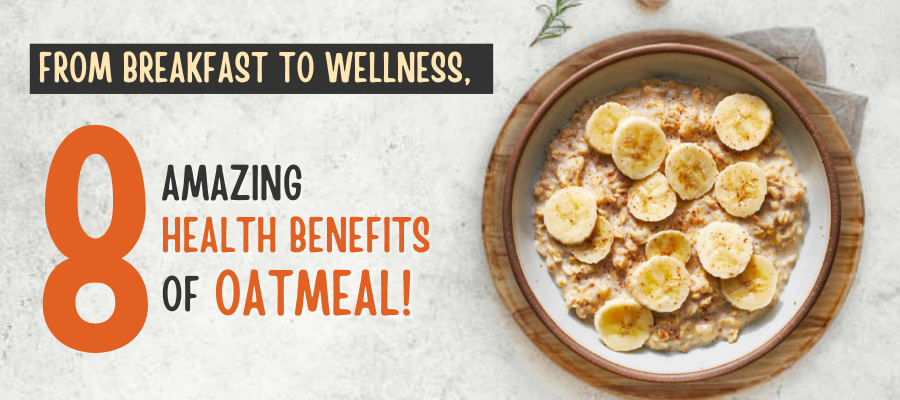Did you know that oatmeal is one of the healthiest foods you can eat? Packed with essential nutrients, oatmeal offers many health benefits that can greatly improve your well-being. In this blog, we'll explore the benefits of oatmeal, its nutritional content, and why you should include it in your diet.
What is Oatmeal?
Oatmeal is a type of porridge made from oats, which are whole grains rich in fiber, vitamins, and minerals. It is usually cooked by boiling oats in water or milk until they become soft and creamy.
Oatmeal is a popular breakfast choice worldwide because it is both delicious and nutritious.
Oatmeal Nutrition Facts
Understanding the nutritional profile of oatmeal can help you appreciate its benefits. Here are the nutrition facts for a typical serving of oatmeal (1 cup cooked):
|
Nutrient |
Amount |
|
Calories |
154 |
|
Carbohydrates |
27 grams |
|
Protein |
6 grams |
|
Fat |
3 grams |
|
Fiber |
4 grams |
|
Sugar |
1 gram |
|
Iron |
2 mg (10% DV) |
|
Magnesium |
56 mg (14% DV) |
|
Phosphorus |
180 mg (18% DV) |
|
Zinc |
2 mg (14% DV) |
|
Folate |
13 mcg (3% DV) |
|
Vitamin B1 (Thiamine) |
0.2 mg (15% DV) |
|
Vitamin B5 (Pantothenic Acid) |
0.5 mg (10% DV) |
1. Supports Heart Health
Oatmeal contains beta-glucan, a type of soluble fiber that helps reduce bad cholesterol (LDL) levels. By lowering cholesterol, oatmeal can reduce the risk of heart disease and improve cardiovascular health.
This makes oatmeal a heart-friendly food that can be easily incorporated into your daily diet.
2. Aids in Weight Management
The high fiber content in oatmeal helps you feel full for longer, which can reduce overall calorie intake and aid in weight management.
Protein in oatmeal also helps maintain muscle mass during weight loss. This makes oatmeal a great choice for those looking to manage their weight effectively.
3. Regulates Blood Sugar Levels
Oatmeal is a great dietary choice for those with diabetes or at risk of developing it. The fiber in oatmeal slows down the absorption of sugar, helping to regulate blood sugar levels.
This makes oatmeal a low glycemic index food, which is beneficial for managing diabetes.
4. Improves Digestive Health
Oatmeal is rich in both soluble and insoluble fiber, which promotes healthy digestion. Soluble fiber forms a gel-like substance in the gut, slowing digestion and increasing nutrient absorption.
Insoluble fiber adds bulk to the stool, helping prevent constipation and promoting regular bowel movements.
5. Boosts Immune System
The beta-glucan found in oatmeal can also boost the immune system. This compound enhances the activity of immune cells, helping the body fight off infections more effectively.
Regular consumption of oatmeal can strengthen your body's natural defenses and keep you healthier.
6. Enhances Skin Health
Oatmeal contains antioxidants and anti-inflammatory properties that can soothe and protect the skin. Oatmeal baths are often recommended for conditions like eczema and dermatitis due to their calming effects on irritated skin.
This makes oatmeal not only good for internal health but also for your skin.
7. Provides Essential Nutrients
Oatmeal is packed with essential nutrients such as manganese, phosphorus, magnesium, iron, zinc, and B vitamins.
These nutrients are crucial for energy production, bone health, and immune function. Including oatmeal in your diet ensures you get these vital nutrients regularly.
8. Improves Athletic Performance
For athletes and active individuals, oatmeal is a superb energy source. The complex carbohydrates in oatmeal provide a steady release of energy, helping to sustain physical activity for longer periods.
The protein content also aids in muscle repair and recovery, making oatmeal ideal for pre- or post-workout meals.
Actionable Tips for Including Oatmeal in Your Diet
1. Start Your Day with Oatmeal: Make oatmeal your go-to breakfast. Try different recipes like overnight oats or oatmeal smoothies for variety.
2. Add Nutritious Toppings: Enhance the nutritional value of your oatmeal by adding fruits, nuts, seeds, and spices like cinnamon.
3. Use Oatmeal in Baking: Substitute flour with oat flour in your baking recipes to increase fiber and nutrient content.
4. Oatmeal as a Snack: Prepare oatmeal bars or energy bites for a healthy and convenient snack option.
5. Savory Oatmeal: Experiment with savory oatmeal recipes by adding vegetables, herbs, and spices for a delicious and nutritious meal.
Conclusion
The benefits of oatmeal are extensive, making it a must-have in your diet. From supporting heart health to boosting the immune system, oatmeal offers numerous advantages that contribute to overall well-being.
Start incorporating oatmeal into your daily routine and experience the powerful health benefits it provides.
Ready to enjoy the benefits of oatmeal? Start adding this nutritious food to your diet today and see the difference it can make in your health.






















